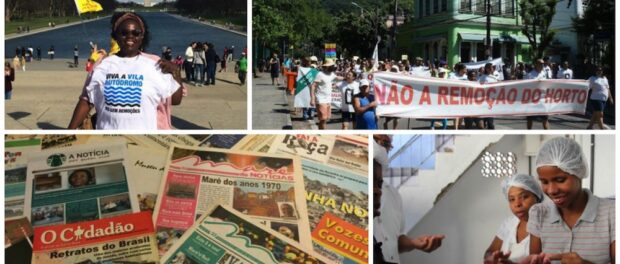
“March Madness” is typically associated with basketball in the United States but it’s an apt term for the past month in Brazil as well. In addition to the country’s political scandals, protests, and economic crisis, March in Rio also featured the single most intense day in Vila Autódromo’s struggle to date, escalating eviction threats across the city, a spike in tension with police in a number of favelas, and innovative community media. To help our readers digest the major news and themes of the past month, we’ve summarized the stories we published here on RioOnWatch along with a few other must-reads in the media on favelas. Access past monthly summaries here and full digests here.
A major highlight of the month was International Women’s Day on March 8. RioOnWatch featured an interview with Mônica Cunha, a leading activist for penal reform and an outspoken critic of the systemic violence that killed her son in 2006, profiled a video on a women’s baking and skill-share collective based in Baixada Fluminense, and celebrated the inspiring warrior women of Vila Autódromo.
On International Women’s Day itself the home of Vila Autódromo activist Maria da Penha was demolished in the morning, only hours before the Rio State Assembly honored her with a Woman Citizen award for her fight for housing rights. On the same day, Mayor Eduardo Paes finally presented a plan for upgrades to Vila Autódromo, a top-down proposal in stark contrast to the community-developed People’s Plan. The time and location of Paes’ press conference were changed last minute, preventing residents from attending.
Residents wrote publicly about the emotional and psychological exhaustion they experienced through the drawn-out process of demolitions. Candomblé practitioner, activist, and former Vila Autódromo resident Heloisa Helena published a letter calling on the United Nations to recognize the neighborhood’s story as a case of human rights abuse. The community continued to organize creative resistance events, hosting the launch of Raquel Rolnik’s new book and later a race and ceremony with the Olympics Poverty Torch, which has been passed between activists at Olympic host cities since Vancouver in 2010.
Evictions in Vila Autódromo and other communities were highlighted in an open letter produced by street children from around the world who participated in the Street Child Games and General Assembly in Rio. Eviction threats have intensified in favelas including Babilônia and Horto, where residents organized a march to fight the removal of their homes from the edge of the Botanical Garden.
In other housing news, the Vito Giannotti occupation in the Port Zone continues to renovate and negotiate to transform the site into public housing. Urban occupations and housing social movements were the focus of recent events at Studio X to celebrate the space’s five years in Rio.
Community media was an important topic this month as local platforms continue to democratize communication. The GatoMÍDIA media collective hosted a media and technology residency in Complexo do Alemão to empower favela youth to develop their natural creativity. Photography collective Imagens do Povo uses art to engage in a political struggle over portrayals of favelas, while in Complexo da Penha resident Cláudia Sacramento Mathias runs a community Facebook page with daily information about security and local news. Meanwhile, The Guardian continued its series of articles written by favela journalists from Rocinha, Complexo do Alemão, and Complexo da Maré.
The newly launched Nós Por Nós (Us for Us) app is designed to help individual citizens document police brutality. It exemplifies the potential of local media and technology, especially at this moment when tension and conflict involving police in favelas is intensifying. Local, real-time documentation of violence is revolutionary given the long history of outside actors producing, portraying, and commodifying violence in Rio’s favelas, as highlighted in the book Spectacular Favela.
Community media also creates new spaces to recognize community memory, and a new documentary about City of God’s 50 years offers a view of the favela that differs from the famous City of God film. Favela memory was the subject of an exhibit in two of Rio’s metro stations in early March. In the Port Zone, the Museum of Tomorrow remains controversial as an installation that disregards the area’s Afro-Brazilian memory.
Finally, in a month of nationwide protests responding to ongoing investigations into Brazil’s political corruption, many favela residents did not take to the streets for or against the current government. More local-level organizing, however, is thriving in places like Madureira Park, which has emerged as a center for mobilization in the North Zone.
Look out for our next summary of articles from April as we enter the final 100 days to go until the Rio 2016 Olympics. For more information and links to favela news from the month, see our full Favela Digest for March 2016 here. You can subscribe to receive the Favela Digest straight to your inbox each month here.
Finally, we’re celebrating the first birthday of our English-language favela news wire, RioONWire, with a push to double its reach in April, so follow it if you’re not already! RioONWire is just part of our compilation of Olympics Resources for Journalists, now in soft launch, designed to facilitate productive reporting ahead of Rio 2016.
